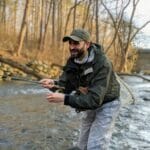In the early 1990s, TU volunteer Rich Redmen had the idea to use large Willow stakes to resurrect a deeply eroding stream bank on the Boquet River in Wadhams, N.Y.
At the time, it was a common practice to load eroding banks with large rocks, often called rip rap. But rip rap could cost 15 to 20 times more than a willow-staking project. Rip rap can also generate downstream flow issues and problems.
The willow-staking efforts of Redman’s design were hardly small or shrub-sized like many garden or small streamside willows that come to mind. These stakes averaged 7-8 feet long and 5-8 inches in diameter. A series of massive Willow stakes were then fashioned and installed on the streamside property of local farmer Vernon Pierce.

The approach was unique enough that it drew the attention of American Agriculturist magazine and the project was featured in the October 1994 issue.
Fast forward some 30 years to this April, when we checked in on the Pierce Family Farm willow project.
More than 75 volunteers recently attended the massive community volunteer event to help further strengthen the legacy of TU’s Boquet River restoration efforts.
Redman was there, too. He represents Trout Unlimited’s New York State Council for Region 5 and serves as a board advisor to the local Lake Champlain Trout Unlimited Chapter. Additionally, Redman writes for New York Outdoor News and often helps to share the great stories of Trout Unlimited staff and volunteer chapters around the state.
Some of those same willows Redman staked many years prior towered on the banks, continuing to provide streamside shade for guests participating in the day’s work — along with the trout swimming below.
Tree planters of all ages took part in a well-orchestrated event, planting a diverse cross section of native trees to help strengthen and supply a canopy of shade above for the river’s trout.
The work not only had a major positive impact on the watershed but allowed volunteers to camp out after to share meals and stories at the rustic Twin Valleys Outdoors Education Center, provided by SUNY Plattsburgh, just a few miles from the site.
The event was made possible by the Arbor Day Foundation, Lake Champlain Trout Unlimited Chapter, Essex County Soil & Water Conservation District, Boquet River Association, Adirondack Council, Ruffed Grouse Society, SUNY Plattsburgh, Trout Unlimited staff and a tremendous group of volunteers.





